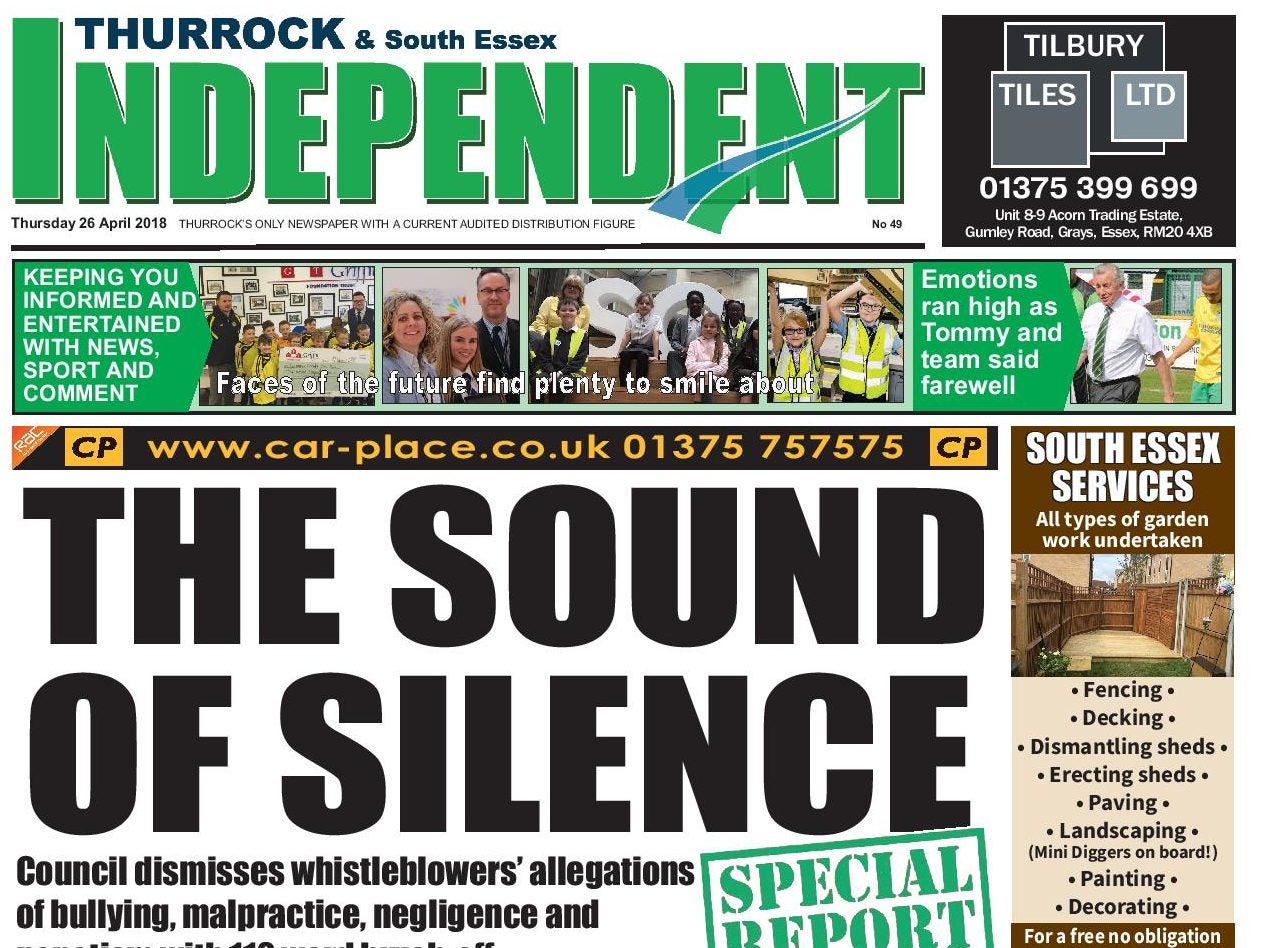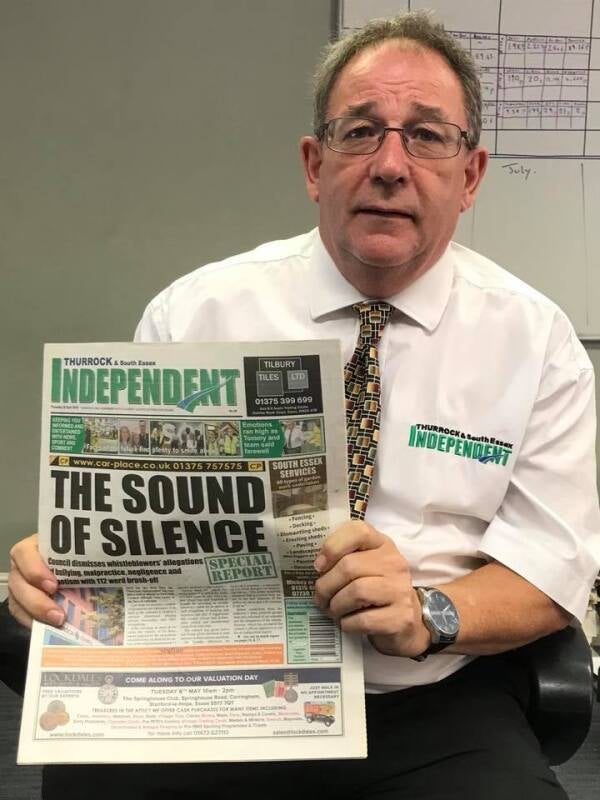
An Essex council has lost a second accuracy complaint against a local newspaper in the space of a month, shortly after “blacklisting” its editor over what it claims is his “vexatious and unreasonable” actions.
The Independent Press Standards Organisation has ruled the Thurrock Independent did not breach Clause 1 (accuracy) of the Editors’ Code of Practice with its “The Sound of Silence” front page, published on 26 April.
The article contained detailed allegations concerning “bullying, malpractice, negligence and nepotism” at Thurrock Council, as revealed in a letter sent to the newspaper by a whistleblower.
It set out specific allegations against the council’s children’s services department, including that a “small child died while under the care of Thurrock Council”.
The article explained the newspaper had approached Thurrock Council with 12 questions relating to the allegations, including asking if it was true that a “young child under the council’s care – at least that the council was aware of – has died in recent months”.
It published the council’s response in full, describing it as a “112 word brush off” and saying the local authority had “dismissed” the claims.
Thurrock Council said the article contained “misleading and damaging allegations” about its children’s services, according to the IPSO ruling.
It said the child was not in the care of the council but that the case was instead “open to social services”.
The council said the article and headline gave the impression it had not taken the whistleblower’s allegations seriously, when it had provided a statement in response to the journalist’s enquiries as is standard practice.
The newspaper said the report was fair, accurate and represented the facts known.
It had decided the letter could only have come from someone inside the council because of the nature of the enclosed documents and screenshots and, after calling two contacts within the council, decided the allegations were a serious and legitimate issue that should be tackled.
The newspaper provided IPSO with its correspondence with the council ahead of publication.
After receiving the council’s response, the journalist asked: “Can I confirm that this 112 word statement is the summary answer to the 12 questions posed in my email to you.
“I need that qualifying because clearly the council appears to have declined to answer some significant and extremely specific questions. You also declined the opportunity to discuss these matters face to face.”
A council representative replied: “Your overall enquiry was referencing a document, so you can take the answer to be in response to the overall ‘whistleblowing’ document.”
The newspaper then repeated its specific question about the child’s death, and did not receive a response until over an hour after its print deadline the next morning.

Thurrock Independent editor Neil Speight with the “Sound of Silence” front page. Picture: Neil Speight
In its ruling, IPSO said the Thurrock Independent was entitled to report on the “series of serious and significant concerns” raised in the whistleblower’s letter provided that it took care not to publish them in an “inaccurate, misleading or distorted manner”.
The regulator said: “The allegation relating to the death of the child, and whether the council could be considered culpable, was presented throughout as an allegation which had been made by the whistleblower, rather than as a statement of fact asserted by the newspaper.
“Care had been taken by the newspaper to review the contents of the whistleblower’s letter, and make enquiries as to its veracity through its contacts within the council, prior to approaching the complainant for comment.”
IPSO noted the authority did not deny the core allegation that a child “under the council’s care” had died, and that it was not in dispute that the child had been known to the council for almost a year and a case had been open at the time of their death.
The regulator added: “Further, the newspaper was entitled to criticise the manner in which the complainant had responded to the whistleblower’s allegations – the basis for the headline’s criticism was set out in full in the print article, including the council’s 112 word response.
“Readers were able to make up their own minds on the legitimacy of the claim that this statement was a ‘brush off’ which ‘dismissed’ the whistleblower’s allegations.”
IPSO previously ruled in the newspaper’s favour after Thurrock Council complained about a front page comment piece headlined: “Council of secrecy and contempt,” and with the sub-headline: “Authority refuses to answer questions about its waste, incompetence and accountability.”
The article had claimed the council’s press officers had not responded to questions on a number of issues despite having days to do so, adding the authority “treats the media with contempt”.
The council argued it was inaccurate to say it had “refused to answer questions” as answers had either previously been provided or the questions had not been asked clearly enough.
Although IPSO raised some concerns about the way the newspaper communicated with the council – including its unclear questions and the large volume of correspondence which was not always relevant – it ruled the authority had not responded in time for the weekly print deadline and the paper was entitled to characterise this as a “refusal” to answer.
Days after this ruling was published earlier this month, Thurrock Council chief executive Lyn Carpenter emailed Thurrock Independent editor Neil Speight to say the authority would no longer respond to his media enquiries after his “repeated breaches of appropriate working practices”.
Speight, who runs the Thurrock Independent alone, said: “Effectively she is placing a ban on any response by the authority to investigative reporting by the newspaper.”
After support for the newspaper came from rival editors and the News Media Association, the council insisted it “continues to engage” with the Thurrock Independent.
However Speight told Press Gazette this was “nonsense”, saying he is effectively a “one man band”.
Speight raised fears that his voluntary part-time colleague, who asked the questions which led to the “Sound of Silence” front page, would also be banned when the IPSO ruling was released, leaving him even less able to send enquiries to the council.
Email pged@pressgazette.co.uk to point out mistakes, provide story tips or send in a letter for publication on our "Letters Page" blog
